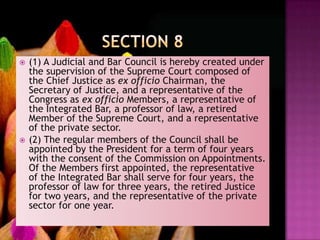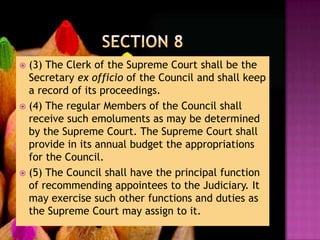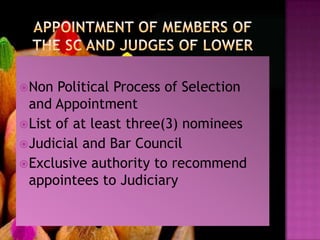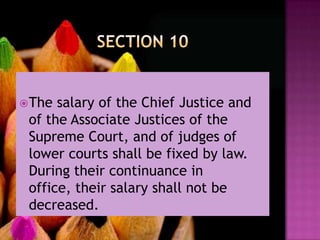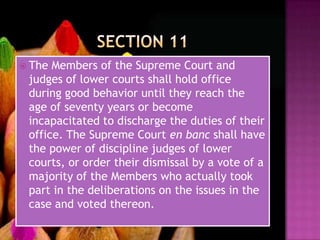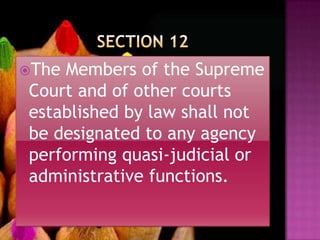Article 8 Section 8 12
- 2. SECTION 8(1) A Judicial and Bar Council is hereby created under the supervision of the Supreme Court composed of the Chief Justice as ex officio Chairman, the Secretary of Justice, and a representative of the Congress as ex officio Members, a representative of the Integrated Bar, a professor of law, a retired Member of the Supreme Court, and a representative of the private sector. (2) The regular members of the Council shall be appointed by the President for a term of four years with the consent of the Commission on Appointments. Of the Members first appointed, the representative of the Integrated Bar shall serve for four years, the professor of law for three years, the retired Justice for two years, and the representative of the private sector for one year.
- 3. SECTION 8(3) The Clerk of the Supreme Court shall be the Secretary ex officio of the Council and shall keep a record of its proceedings. (4) The regular Members of the Council shall receive such emoluments as may be determined by the Supreme Court. The Supreme Court shall provide in its annual budget the appropriations for the Council. (5) The Council shall have the principal function of recommending appointees to the Judiciary. It may exercise such other functions and duties as the Supreme Court may assign to it.
- 4. Section 9The Members of the Supreme Court and judges of lower courts shall be appointed by the President from a list of at least three nominees prepared by the Judicial and Bar Council for every vacancy. Such appointments need no confirmation. For the lower courts, the President shall issue the appointments within ninety days from the submission of the list.
- 5. Appointment of Members of The SC and Judges of Lower CourtsNon Political Process of Selection and AppointmentList of at least three(3) nomineesJudicial and Bar CouncilExclusive authority to recommend appointees to Judiciary
- 6. Section 10The salary of the Chief Justice and of the Associate Justices of the Supreme Court, and of judges of lower courts shall be fixed by law. During their continuance in office, their salary shall not be decreased.
- 7. Compensation of Members of JudiciaryProhibition against reductionChief Justice: Php240,000Associate Justice: Php 204,000Purpose of the Prohibition
- 8. Section 11The Members of the Supreme Court and judges of lower courts shall hold office during good behavior until they reach the age of seventy years or become incapacitated to discharge the duties of their office. The Supreme Court en banc shall have the power of discipline judges of lower courts, or order their dismissal by a vote of a majority of the Members who actually took part in the deliberations on the issues in the case and voted thereon.
- 9. Tenure of OfficeMembers of the SC & Judges of lower courts shall hold office until they reach the age of 70 or become physically & mentally incapacitated to discharge the duties of their office.
- 10. Section 12The Members of the Supreme Court and of other courts established by law shall not be designated to any agency performing quasi-judicial or administrative functions.
- 11. Reason for the prohibitionDesignation violates the doctrine of separation of powers between judicial & executive branchDesignation would contribute to further delays in disposition


